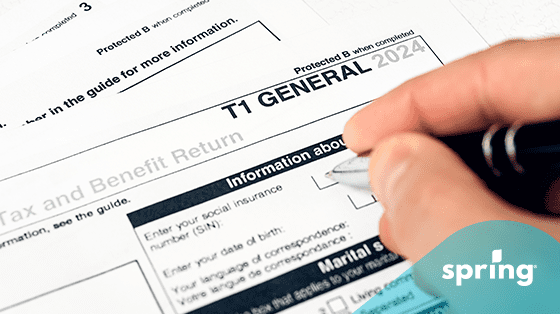This is because your income and credit history are taken into account, just like the person that you’re co-signiThis is because your income and credit history are taken into account, just like the person that you’re co-signing for.
Before you agree to co-sign on a mortgage, it’s important to consider how co-signing will affect you and what a co-signer mortgage involves. Even though you aren’t the primary borrower or primary applicant on the home purchase, it still gets added to your credit report and will stay there until it’s paid off or until the end of the mortgage term.
Requirements for Mortgage Cosigning in Canada
When it comes to co-signing a mortgage in Canada, you’ll be there until the duration of the mortgage is paid off unless you’re physically taken off of the mortgage. Because of this, lenders look for co-signers who have solid finances and good credit scores. This reduces the risk for them and gives them more assurance that they’ll get their funds back.
The specific factors lenders look for in a lender are:
- A credit score of 660 or higher
- Full-time employment
- A low debt ratios
- A high monthly income
They have to be sure that, in the event the borrower can’t pay the funds back, the co-signer can afford to do so. Once this is proven, then the mortgage lender can get your mortgage approved.
Tax Implications of Co-signing
When you co-sign a mortgage in Canada, you’re considered as part owner of the property. This means that as that property increases in value, you’re still seen as the owner. How does this affect your taxes? Well, you could have to pay capital gains when the property is sold since you’re considered to be a partial owner.
Types of Co-signing
In Canada, there are two different types of mortgage co-signers. One is a guarantor, whereas the other is a co-signer. What’s the difference, though? Well, guarantors are co-signers who aren’t added to the title. They don’t actually make mortgage payments, but they are vouching for the borrower and agree to make the payments in the event that the actual borrower can’t make the payments.
Cosigners agree to make the payments with the other borrower, which are included in the title of the property. This usually refers to a spouse or a parent who co-owns the property with you. Both of these are technically cosigners, though. That said, mortgage lenders tend to prefer co-borrowers over guarantors when it comes to mortgage agreements. It can be slightly more challenging to get a loan with a guarantor than getting co-signed mortgages, but that doesn’t mean it’s impossible. It’s important to note, though, that cosigners don’t have to be co-borrowers on a home loan. If it’s joint ownership or equal ownership, then they’re considered co-borrowers, and these are called joint mortgages. If their name is on the title and the mortgage documents, but there isn’t joint ownership, then they’re considered to be co-signers. They’re very similar, though.
Guarantor Vs Cosigner
There is a significant difference when it comes to being a guarantor or a co-signer. For starters, co-signers have to make any missed payments right away if the primary borrower misses or defaults on a payment. Mortgage guarantors don’t have to assume loan payments until the primary borrower or primary borrowers fails to make payments and defaults on the mortgage, so late mortgage payments will affect and lower credit scores.
Whether you are a co-signer or a guarantor, though, you’re taking the same risk. You’re putting your money and your credit on the line. The purchase will show on your credit report and reflect on your overall credit history, even though you’re not the primary borrower.
How Co-signing Affects Your Credit Score
Co-signing a mortgage can affect your credit score in a number of ways, but before we get into that, the first thing that we should mention is that co-signing also affects your borrowing power. Even though you aren’t the primary borrower on the mortgage loan, you’re still responsible for that debt if it can’t be paid. This means you should still need to be able to afford it. It will affect your debt service ratios and will be included on your credit report for lenders to see.
When it comes to your credit score, it can help build your score or tear it down. What happens is based on whether the person you agreed to the co-signed mortgage for makes their monthly mortgage payments on time or not. If they do, you see the credit benefits without having to make the payments. If they don’t, however, then you’re responsible for making those mortgage payments, but the damage will already be reflected in your credit report. If you’re unable to pay the mortgage, then that default will also show on your credit report.
Co-signers and First-Time Home Buyers
As a first-time home buyer, you’re entitled to many different benefits. That said, having a co-signer on your mortgage application can affect these benefits. While you may not have to give them up altogether, they will be affected, and you could receive less.
Why is this exactly? Well, it’s generally because co-signers have already purchased a home. This is in the case of a guarantor. In the case of a co-borrower, you’re likely just to have the benefits reduced or have to share them.
Benefits of Co-signing for a Mortgage
When it comes to co-signing for mortgage loans, there are more benefits for the primary borrower than there are for you. That said, having a large loan with on-time payments does look good on your credit report. It will likely increase your credit score, and if you aren’t looking to borrow funds anytime soon, it won’t have much of a negative effect. That said, if you’re a co-owner, you do have access to home equity.
The main benefits of co-signing for a mortgage go to the primary borrower. If you’re co-signing, it’s likely difficult for them to get a mortgage on their own, and the bank is trying to help the primary borrower qualify. It can be challenging to get a co-signer, so they’re lucky to be able to find one.
Disadvantages and Risks Associated with Co-signing
While there aren’t many benefits when it comes to co-signing for a mortgage, there are plenty of risks. Or really, there are just a few significant risks. The primary risk is that the primary borrower is unable to make their payments. If this happens, then it means you need to make the payments or risk a default. This is a huge responsibility to take on.
Cosigning a Loan for a Friend or Family Member
If you do decide to co-sign, you want to be sure that you’re co-signing for a person you can trust, like friends or family members. As a co-signer, you don’t want to have to make any payments; the idea is to help them get a mortgage they can afford by themselves. Unfortunately, though, sometimes things don’t always work out, and your financial situation can change so that you can be on the hook for the money. This is why you want to think carefully and make informed decisions before you decide to co-sign or not.
Credit Score Needed for a Mortgage with a Cosigner
When you’re the primary borrower, your credit score doesn’t matter as much as the cosigner. Your credit score is likely under 660, and you’re considered to have bad or poor credit, which is why a cosigner is needed. However, they do take both the primary borrower’s and the cosigner’s credit histories into account.
One important thing to remember is that as you make your payments on your mortgage and keep up with your bills, you will be able to increase your credit score and get the mortgage solely in your name faster. A high credit score doesn’t just affect your purchasing a home; it impacts many different parts of your life.
When Should You Consider a Co-signer?
If you have the down payment for a mortgage but just don’t quite meet the minimum requirements for a mortgage, instead of giving up, you may want to consider a co-signer. Even if you can get a larger down payment, lenders like to see the primary borrowers’ credit score in good standing. If it isn’t, they prefer a good co-signer to help with the approval process. This is because co-signers essentially vouch for you to purchase the home, but you have to keep up with the payments. When they sign, they’re putting their finances and credit at risk.
When it comes to getting a co-signer, you don’t always have to have a joint mortgage. With a mortgage guarantor, they aren’t even on the title, but their higher credit score can help you get a better mortgage rate. As mortgage rates rise, debt payments get higher and higher, Canadians are starting to incur too much debt, and many are considering co-signers.
Before you take on a co-signer, you want to be sure that you’re going to be able to keep up with the payments. As you continue to make your payments, you’ll notice your credit getting better. Since you need to renew your montage every few years based on your loan term, you may be able to get the mortgage solely in your name when you renew. They don’t necessarily have to stay on the mortgage for the full amortization of the loan. The bank just likes to see the co-signer stay on the mortgage for the first mortgage term.
In most cases, borrowers need a co-signer because they don’t have a strong credit score, they have a short employment history, they don’t have a solid income, and, even if they’re approved, the mortgage rates make it impossible for them to afford. A cosigner can change their personal finance situation and help them save money.
Credit Score Needed for a Mortgage
While we have touched a little on the credit score needed for a mortgage, we should go over all of the different restrictions. As we mentioned, financial institutions consider a credit score of at least 600 in order to get a mortgage. The primary lender isn’t the only one you need to consider when looking into getting a mortgage, though. If you need CMHC insurance on your mortgage, then you need to make sure you meet their credit score requirement, which is 600.
If you’re looking to purchase a home but don’t quite have 600, then this is where a co-signer comes in. If you may be able to afford the payments but don’t quite meet the qualifications, then a co-signer can help with little risk, as long as their credit score is higher than 600.
How to Ensure You’re Protected as a Co-signor or Primary Borrower
Whether you’re the primary borrower or a co-signer, you want to be sure that you’re protected and prepared for any situation. The best way to do this is by consulting with a real estate lawyer. Depending on your position, before entering into the mortgage, you may want to consider what the implications could be in the event everything goes wrong. Some even recommend getting a separate contract, apart from the mortgage contract, put into place that covers all possible scenarios. This way, there’s a plan in place for worst-case scenarios.
Ways To Increase Your Credit Score
Passing a mortgage stress test is difficult enough, but on top of that, you also have to consider your credit score. If you don’t quite meet the credit requirements to get a mortgage, you can choose to go with a mortgage co-signer. That said, if you’re not far off from meeting the credit score requirements, then you can choose to wait a little longer and improve your credit score. It doesn’t take over a decade to fix your credit score; there are actually ways to increase it faster.
Before you decide to go through the approval process again, there are a few things you can do to push that credit score to where you need it. The first thing is to manage your debt load. You may be wondering how this helps your credit score. Well, let’s take a look.
If you have revolving debt like lines of credit and credit cards, the higher your balance is above 30%, the more negative the effect is on your credit score. This is because it shows your financial responsibility isn’t where it should be. However, there’s a simple way to fix this. If you can get a personal loan or pay down those balances, you’re going to notice a significant increase in your credit score.
Another thing you can do is make timely payments, missed payments can decrease your credit score as well as make it more difficult to increase your score over time. You should also pay close attention to your credit reports because sometimes the information on it isn’t accurate. You can then dispute the inaccurate information, which can also increase your credit score.
Final Thoughts
Mortgages can be very difficult to get in the current housing market. Not only do you need a good credit score, but you also have to meet certain income requirements and have a down payment, which you can get some help with through assistance programs. Sometimes, even if you have all of these things, you need a little extra help. The best way to do this is with a co-signer or a guarantor. Either one of these will co-sign for you and help you get the mortgage that you need,
As a cosigner or a guarantor, it’s important that you do your research before you decide to co-sign. There are plenty of risks that come with co-signing a loan of any kind. It’s more common for co-signers to co-sign on things like auto loans and personal loans since you’re assuming equal responsibility. Mortgages last much longer than either of these and can affect your credit score as well as your borrowing power. No matter what you decide to do, though, there are benefits; you just have to weigh your options and make sure you can trust the primary borrower.









